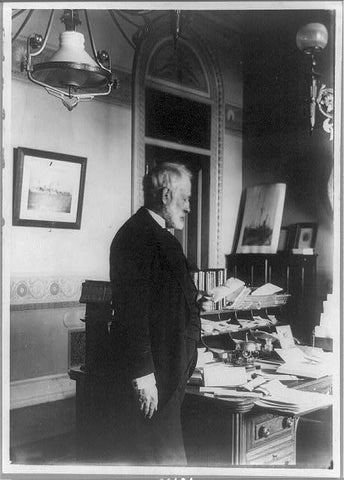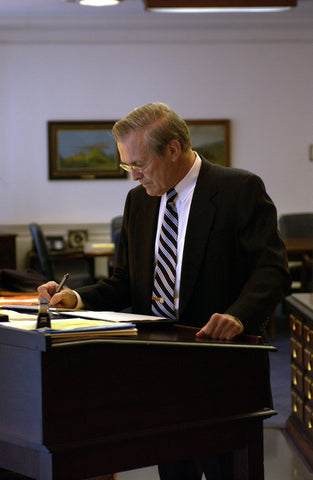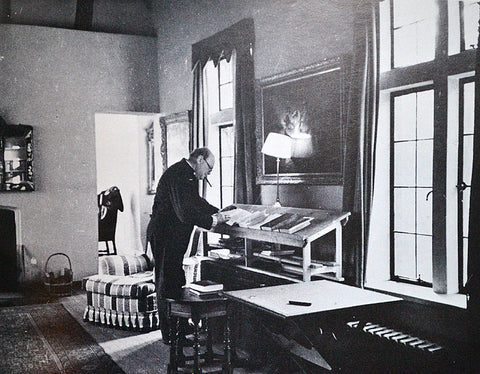Does a comfortable chair make for a more productive day at work? Workplace conditions are constantly changing, from simple wooden benches to modern leather swivel armchairs. We’ve evolved in the way we sit and work. However, comfortability aside, are these modern office chairs really a boon or bane?
The truth is human physiology is not adapted to being seated for hours. No matter how comfortable an office chair is, a worker still gets backache after many hours spent sitting. People who spent 10 to 20 years over a deskwork, can share stories of visiting the doctors and massage therapists often. One of the solutions to this problem is working while standing. Best adjustable standing desks are the results of centuries of evolution. Next, we will provide a brief review of the history of the desk.
The Da Vinci Desk
Judging by the early medieval paintings and engravings we can suppose, that standing work desks were quite common in those days. The usual horizontal table was used to eat, play cards, etc. Probably, people then did not work sitting as much. However, Leonardo da Vinci did things differently, he created his work of art and more while standing at a standing desk. Since his ideas transcended his time, it's safe to say that the genius built his own version of the standing desk.
19th Century Desks
The relevance of the standing desk continued up to the 19th century and by then people understood the harmful effects of prolonged sitting. The main cause of its growing popularity then can be attributed to the rapid development of industrial production. More goods, more documents, therefore - more clerks. It has been noticed that standing work desks improved productivity. For further convenience, many upright secretary desk models with adjustments, additional stands, etc. were invented.
Benjamin Franklin Desk

Not only is Benjamin Franklin known as a politician and one of the Founding Fathers but also a writer, journalist, inventor, diplomat. Naturally, he had to process many documents and it maybe safe to say that those were his most productive years.
Thomas Jefferson Standing Desk
When writing the Declaration of Independence, Thomas Jefferson used his usual standing desk. The angle of the desk's top was regulated by a special ratchet mechanism. To make architectural drawings, the third US president had a table with an extremely large top. Interestingly, the same Thomas Jefferson standing desk is on display in the US State Department.
20th Century Desks
Since the beginning of the 20th century, seated deskwork became customary. 1950s office furniture producers were completely focused on accessories for sedentary work. Even today, the share of sedentary jobs in the United States is more than 80%. And this is an alarming trend since an inactive lifestyle negatively affects the health of employees, increasing the risk of cardiovascular diseases, excess weight, and high blood pressure. The wheel of history turned once again and the good old standing desk gains its former popularity.
Ernest Hemingway Standing Desk
The great novelist and Nobel laureate, Ernest Hemingway surprised many with his energy and creativity. It is not difficult to guess that the writer worked at a standing table. Hemingway's standing desk appeared in his office following the example from one of his editors. At first, standing work helped the writer to recover from the trauma of World War I. Subsequently, the writer worked on a typewriter installed at a chest level.
Winston Churchill Standing Desk
The most renowned among the British leaders of the 20th century is famous not only for his qualities as a politician but also for extreme productivity despite excess weight and chain-smoking. It can be assumed that his amazing performance is to some extent due to the habit of working with documents using the Churchill standing desk. Seems like Sir Winston knew a secret that helped him stay active up to 90 years of age.
Donald Rumsfeld Standing Desk

The merit of the Republican politician to the American people and the international community are largely due to his amazing performance. Rumsfeld's standing desk is quite similar to that Thomas Jefferson used and that is probably the reason why the politician remained in good physical shape and worked until he was old. The ex-ministers spokeswoman told reporters that her 71-year-old boss worked for 8-10 hours a day over a Donald Rumsfeld standing desk and sat down only during lunch.
Why use a Standing Desk?
So, why should you use a standing desk? The positive experience of our ancestors serves to affirm today's rapidly growing popularity of the standing desk. Facebook employees serve a bright example of this trend. After the publication about the potential danger of sedentary work, company employees turned to management asking to modify their workplaces.
At Progressive Desk, We ensure that each of our employees uses a height-adjustable standing desk while working. The keeps productivity and energy levels at our workplace high and positive





